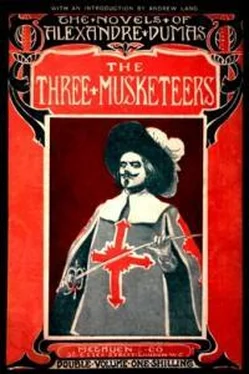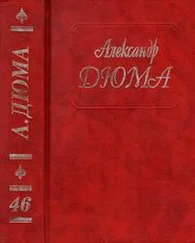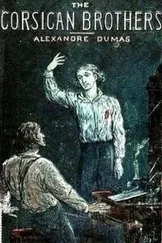On the landing they were no longer fighting, but amused themselves with stories about women, and in the antechamber, with stories about the court. On the landing d’Artagnan blushed; in the antechamber he trembled. His warm and fickle imagination, which in Gascony had rendered formidable to young chambermaids, and even sometimes their mistresses, had never dreamed, even in moments of delirium, of half the amorous wonders or a quarter of the feats of gallantry which were here set forth in connection with names the best known and with details the least concealed. But if his morals were shocked on the landing, his respect for the cardinal was scandalized in the antechamber. There, to his great astonishment, d’Artagnan heard the policy which made all Europe tremble criticized aloud and openly, as well as the private life of the cardinal, which so many great nobles had been punished for trying to pry into. That great man who was so revered by d’Artagnan the elder served as an object of ridicule to the Musketeers of Treville, who cracked their jokes upon his bandy legs and his crooked back. Some sang ballads about Mme. d’Aguillon, his mistress, and Mme. Cambalet, his niece; while others formed parties and plans to annoy the pages and guards of the cardinal duke—all things which appeared to d’Artagnan monstrous impossibilities.
Nevertheless, when the name of the king was now and then uttered unthinkingly amid all these cardinal jests, a sort of gag seemed to close for a moment on all these jeering mouths. They looked hesitatingly around them, and appeared to doubt the thickness of the partition between them and the office of M. de Treville; but a fresh allusion soon brought back the conversation to his Eminence, and then the laughter recovered its loudness and the light was not withheld from any of his actions.
"Certes, these fellows will all either be imprisoned or hanged," thought the terrified d’Artagnan, "and I, no doubt, with them; for from the moment I have either listened to or heard them, I shall be held as an accomplice. What would my good father say, who so strongly pointed out to me the respect due to the cardinal, if he knew I was in the society of such pagans?"
We have no need, therefore, to say that d’Artagnan dared not join in the conversation, only he looked with all his eyes and listened with all his ears, stretching his five senses so as to lose nothing; and despite his confidence on the paternal admonitions, he felt himself carried by his tastes and led by his instincts to praise rather than to blame the unheard–of things which were taking place.
Although he was a perfect stranger in the court of M. de Treville’s courtiers, and this his first appearance in that place, he was at length noticed, and somebody came and asked him what he wanted. At this demand d’Artagnan gave his name very modestly, emphasized the title of compatriot, and begged the servant who had put the question to him to request a moment’s audience of M. de Treville—a request which the other, with an air of protection, promised to transmit in due season.
D’Artagnan, a little recovered from his first surprise, had now leisure to study costumes and physiognomy.
The center of the most animated group was a Musketeer of great height and haughty countenance, dressed in a costume so peculiar as to attract general attention. He did not wear the uniform cloak—which was not obligatory at that epoch of less liberty but more independence—but a cerulean–blue doublet, a little faded and worn, and over this a magnificent baldric, worked in gold, which shone like water ripples in the sun. A long cloak of crimson velvet fell in graceful folds from his shoulders, disclosing in front the splendid baldric, from which was suspended a gigantic rapier. This Musketeer had just come off guard, complained of having a cold, and coughed from time to time affectedly. It was for this reason, as he said to those around him, that he had put on his cloak; and while he spoke with a lofty air and twisted his mustache disdainfully, all admired his embroidered baldric, and d’Artagnan more than anyone.
"What would you have?" said the Musketeer. "This fashion is coming in. It is a folly, I admit, but still it is the fashion. Besides, one must lay out one’s inheritance somehow."
"Ah, Porthos!" cried one of his companions, "don’t try to make us believe you obtained that baldric by paternal generosity. It was given to you by that veiled lady I met you with the other Sunday, near the gate St. Honor."
"No, upon honor and by the faith of a gentleman, I bought it with the contents of my own purse," answered he whom they designated by the name Porthos.
"Yes; about in the same manner," said another Musketeer, "that I bought this new purse with what my mistress put into the old one."
"It’s true, though," said Porthos; "and the proof is that I paid twelve pistoles for it."
The wonder was increased, though the doubt continued to exist.
"Is it not true, Aramis?" said Porthos, turning toward another Musketeer.
This other Musketeer formed a perfect contrast to his interrogator, who had just designated him by the name of Aramis. He was a stout man, of about two– or three–and–twenty, with an open, ingenuous countenance, a black, mild eye, and cheeks rosy and downy as an autumn peach. His delicate mustache marked a perfectly straight line upon his upper lip; he appeared to dread to lower his hands lest their veins should swell, and he pinched the tips of his ears from time to time to preserve their delicate pink transparency. Habitually he spoke little and slowly, bowed frequently, laughed without noise, showing his teeth, which were fine and of which, as the rest of his person, he appeared to take great care. He answered the appeal of his friend by an affirmative nod of the head.
This affirmation appeared to dispel all doubts with regard to the baldric. They continued to admire it, but said no more about it; and with a rapid change of thought, the conversation passed suddenly to another subject.
"What do you think of the story Chalais’s esquire relates?" asked another Musketeer, without addressing anyone in particular, but on the contrary speaking to everybody.
"And what does he say?" asked Porthos, in a self–sufficient tone.
"He relates that he met at Brussels Rochefort, the AME DAMNEE of the cardinal disguised as a Capuchin, and that this cursed Rochefort, thanks to his disguise, had tricked Monsieur de Laigues, like a ninny as he is."
"A ninny, indeed!" said Porthos; "but is the matter certain?"
"I had it from Aramis," replied the Musketeer.
"Indeed?"
"Why, you knew it, Porthos," said Aramis. "I told you of it yesterday. Let us say no more about it."
"Say no more about it? That’s YOUR opinion!" replied Porthos.
"Say no more about it! PESTE! You come to your conclusions quickly. What! The cardinal sets a spy upon a gentleman, has his letters stolen from him by means of a traitor, a brigand, a rascal–has, with the help of this spy and thanks to this correspondence, Chalais’s throat cut, under the stupid pretext that he wanted to kill the king and marry Monsieur to the queen! Nobody knew a word of this enigma. You unraveled it yesterday to the great satisfaction of all; and while we are still gaping with wonder at the news, you come and tell us today, ’Let us say no more about it.’"
"Well, then, let us talk about it, since you desire it," replied Aramis, patiently.
"This Rochefort," cried Porthos, "if I were the esquire of poor Chalais, should pass a minute or two very uncomfortably with me."
"And you—you would pass rather a sad quarter–hour with the Red Duke," replied Aramis.
"Oh, the Red Duke! Bravo! Bravo! The Red Duke!" cried Porthos, clapping his hands and nodding his head. "The Red Duke is capital. I’ll circulate that saying, be assured, my dear fellow. Who says this Aramis is not a wit? What a misfortune it is you did not follow your first vocation; what a delicious abbe you would have made!"
Читать дальше












